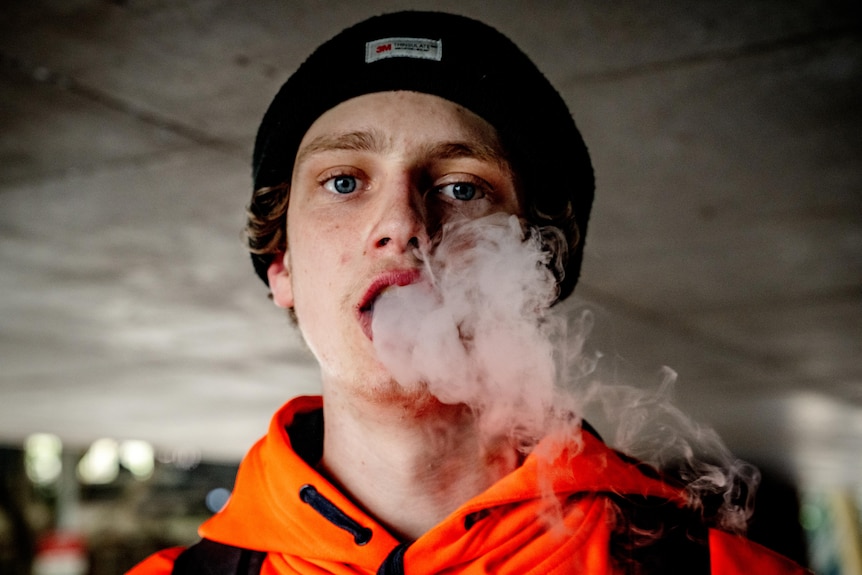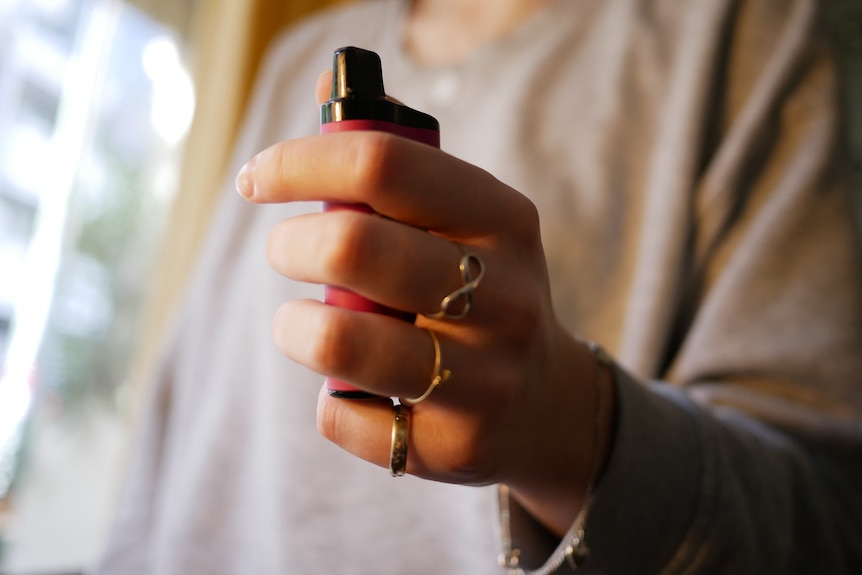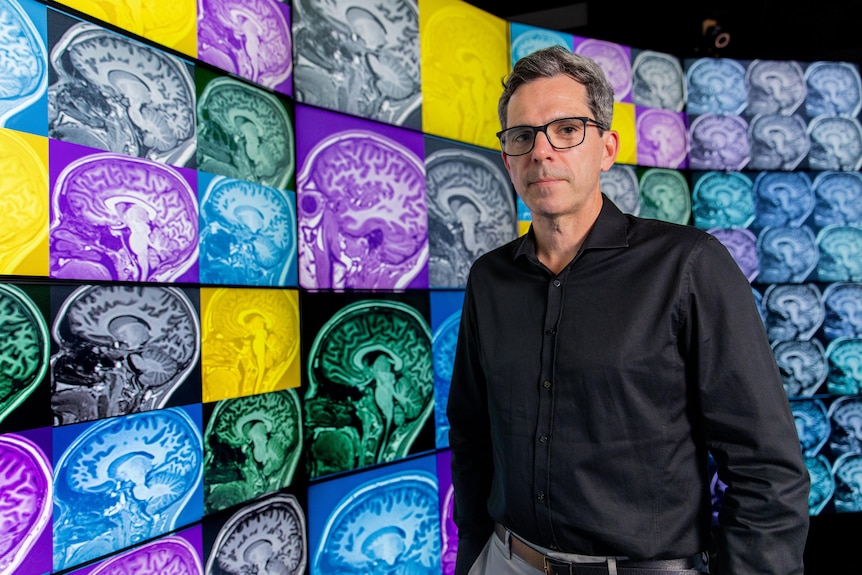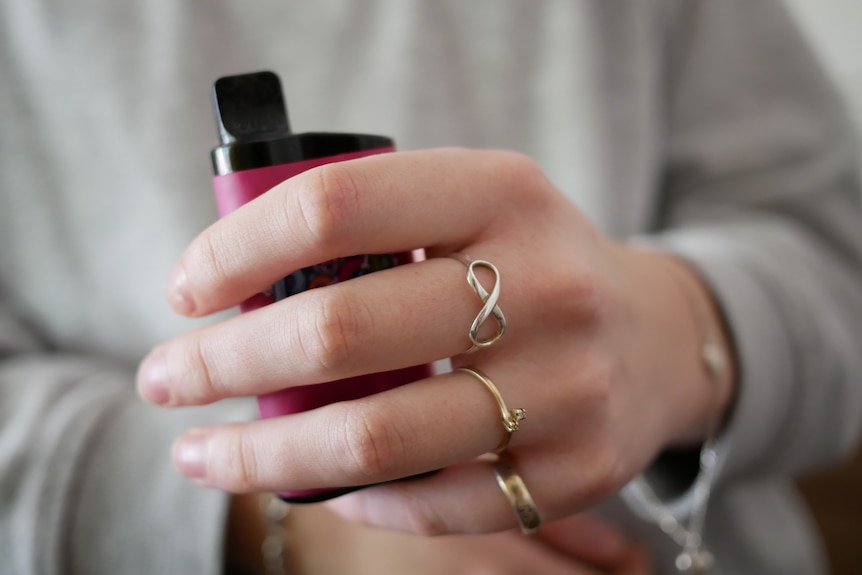Young people are more likely to have poor mental health, a new report shows
For Geo, the rush he gets from the species is euphoric.
The 17-year-old electrician started smoking at the age of 13 after a brief stint smoking cigarettes.
“Everybody around was doing it, it’s really the peer pressure side, and [they’re] it’s cheaper than missiles, much cheaper,” he said.
“I like to be honest, just the effect it has on me.
“I can focus better, I can concentrate more.”

Geo says he feels “stressed” and “worried” when he doesn’t date for a while.
But he thinks there may be a link between his steam and mental health.
“The only time I notice in my mind [health] that’s when I spend some time without it,” he said.
“It makes me feel stressed, anxious, like I need it, like there’s something missing.”
Depressed teenagers are twice as likely to experience depression
The Matilda Center for Mental Health and Substance Use Research paper, published today in the Australian and New Zealand Journal of Psychiatry, found young people who vape are more likely to have poorer mental health .
The survey of more than 5,000 year 7 and 8 students across three states is the most comprehensive data on e-cigarette use and mental health among early Australian youth.
Associate Professor and Principal Investigator Emily Stockings said while the study found that only 8 percent of respondents had used a vape, those with major depressive symptoms were twice as likely to use cigarettes. electronic.
“For those with low health, they were 100 percent more likely to smoke and those with high stress were 74 percent more likely to smoke,” he said. like that.
The study found that about 22 percent of the youth surveyed had moderate to severe depression, 20 percent had anxiety moderate to severe and a third had poor health.
“So, these are mentally ill people,” he said.

Researchers surveyed 5,000 teenagers about their vape use. (ABC News: Rachel Carbonell)
Does vaping cause mental health or does mental health lead to obesity?
The study showed a correlation between the two, but did not establish a causal link.
Associate Professor Stockings said evidence from previous studies suggested it could be “bidirectional”.
“There have been studies that have shown that stress causes vaping and there have been studies that have shown that vaping causes depression,” he said.
He said it was easy to see why young people with mental health problems would be drawn to vaping with bright colors and clever advertising, but adding nicotine is a powerful ingredient.
“Nicotine is an incredibly effective brain drug…once it’s in the bloodstream it hits your brain in seconds.
“It gives you this combined feeling of reduced anxiety… but also a little buzz because of the stimulating effect.”
Loading…
Understanding the adolescent brain is critical to dealing with vaping
Associate Professor Stockings says research shows mental health and steam need to be addressed together.
“We know that education alone, telling someone, ‘don’t use drugs’ or ‘don’t drink’, doesn’t work. Education alone is not enough,” he said.
The data is part of the largest vaping prevention trial in Australia, which aims to examine whether young people are less likely to use vaping if they are given early vaping skills in the classroom.

Associate Professor Emily Stockings said the study found that those with high levels of stress were more likely to vape.
(It is given)
It will follow up with research participants after three years.
“What we think will help in this age group is what we’ve seen and the evidence of it [is]… we give them skills training, coping skills, techniques, telling them how to help a friend, how to know when you’re not doing well, how to effectively seek help,” he said. said so.
Professor of adolescent mental health and neurobiology at the University of the Sunshine Coast Dan Hermens said understanding the adolescent brain, which is wired to “seek new things”, was important.
“[It] has an overreaction to gratifying behavior, often described as dangerous,” he said.
One of the ways the brain responds is by releasing dopamine, the feel-good hormone, with research showing that it can be two to seven times more likely in teenagers to respond to reward-seeking behavior.
He said because vaping often involves friends, exposure and nicotine, it is a “perfect storm”.
“The adolescent brain, we know from various studies, has increased dopamine response in all kinds of behaviors,” he said.
“When you add an addictive substance like nicotine, the response to dopamine is even greater.”

Professor of adolescent mental health and neurobiology at the University of the Sunshine Coast Dan Hermens says understanding the adolescent brain is important. (It is given)
Professor Hermens said the young brain is going through an important natural process.
He said: “…
“It is undoubtedly the most intense period of our lives in terms of brain changes and comes with increased vulnerability.”
Professor Hermens said that although vaping anxiety is often associated with harmful chemicals, nicotine alone can change “brain activity and function”.
“By stimulating the brain to release dopamine, if done over a long period of time, it changes the way the brain responds to rewarding things,” he said.
Neuroscientists believe that it can be more difficult to do things without nicotine and prevent the same response in healthy activities.
A teenager quits smoking after health problems
Emeliya, 18, first tried smoking last year when she was at a friend’s birthday party.
“They were all doing it in the community … so, I just came in,” he said.
At first he didn’t like it, but soon he noticed the change.

The study is the latest and most comprehensive data on e-cigarette use and mental health among young adults. (ABC News: Rachel Carbonell)
“I felt less stressed after smoking,” she said.
He was worried about the health consequences and recently decided to quit.
He said: “You could see in my face I was breaking out, like I was really sick after I had a bad breath. It was really bad.
“I feel so much better that I can’t breathe…
“I feel like I can go out and sit in the sun… and I can breathe normally without smoking.”
Shameless, curious
Senior researcher Emily Stockings said that while she hoped banning vapes would make it less acceptable to society, more could be done.
For parents and carers, Professor Associate Professor Stockings said being curious about why they smoke and how it makes them feel can help overcome shame.
“We are good at preventing things, we are good at playing by the rules, and to make people quiet when they do these things, it becomes a hidden behavior instead of what they intend to do. talk and seek help,” he said.
Loading…
Professor Hermens agreed.
His advice was to talk to the youth about how their mind works instead of bad behavior.
“It’s important to understand as parents and teachers that there is a reason why young people like to … do different things and that includes drug use,” he said.
“It’s important to understand that kind of biology, but it’s difficult because young people … talk like adults.
“They’re becoming more self-aware, more insightful.”
He said that adults should help young people to know what to focus on instead, with one possible solution being to help young people find natural ideas by taking risks. good.
“I think there’s a lot of things from … hiking to doing weird things with your friends, like outside, you know jumping in the water, it’s safe but there’s a risk young, playing a school game, it’s a hobby,” he said.
Loading
Mental health problems among young people have increased by almost 50 percent in 15 years. ABC talks to young people, parents, and researchers about what’s driving this trend, and what can be done to change things.
#Young #people #poor #mental #health #report #shows
